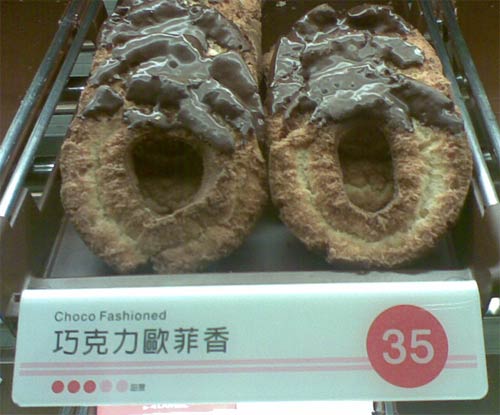Here’s a shot of some Hanzified, Mandarinized English I recently came across. Qiǎokèlì (巧克力) is of course a well-established loan word, from the English “chocolate” (though here the English is given in the more Japanese-English form of choco, as befits a Japanese donut chain store in Taiwan). Ōufēixiāng (歐菲香) is a rendering of “old fashioned.” Although the “old” is missing from the English above, it can be seen in both of the tags pictured below.

Bái kěkě ōufēixiāng (白可可歐菲香) and yuán wèi ōufēixiāng (原味歐菲香).
And if that’s not enough to fill you up with Hanzified English, perhaps try a piece of Bōshìdùn pài (波士頓派), i.e., “Boston [cream] pie.”


Reminds me of “feimengsi”, the weight-loss/beauty parlours that used to advertise on Taiwanese TV in the mid 90’s (or mid 80s in ROC years). I can’t remember how they wrote it though 菲夢斯 perhaps? The most memorable thing was how they compared “before and after” photos of women who not only lost a lot of weight, but gained a foot in height! The “before” photos had quite obviously been squished to make them shorter and fatter.
Hey…I just thought, maybe after a couple of days of no-one buying them they get renamed “非香”!
Mister Donut in Seoul carries choco-fashion donughts, which are the same as what’s pictured above. “old fashion” doughnuts are often the next one over which are the same but lacking chocolate.
Pingback: Sinoglot | Link roundup — 31 May 2011